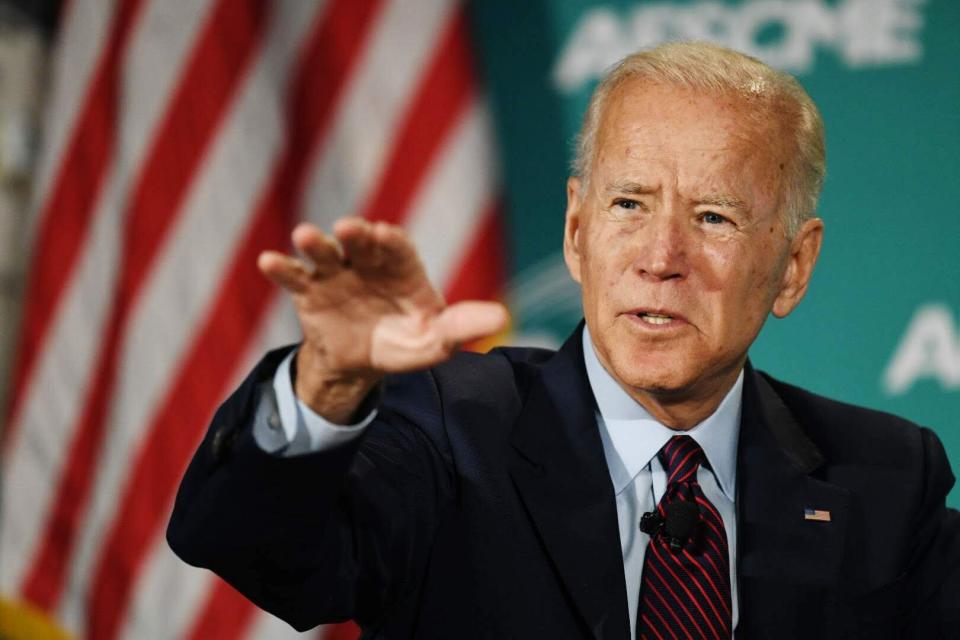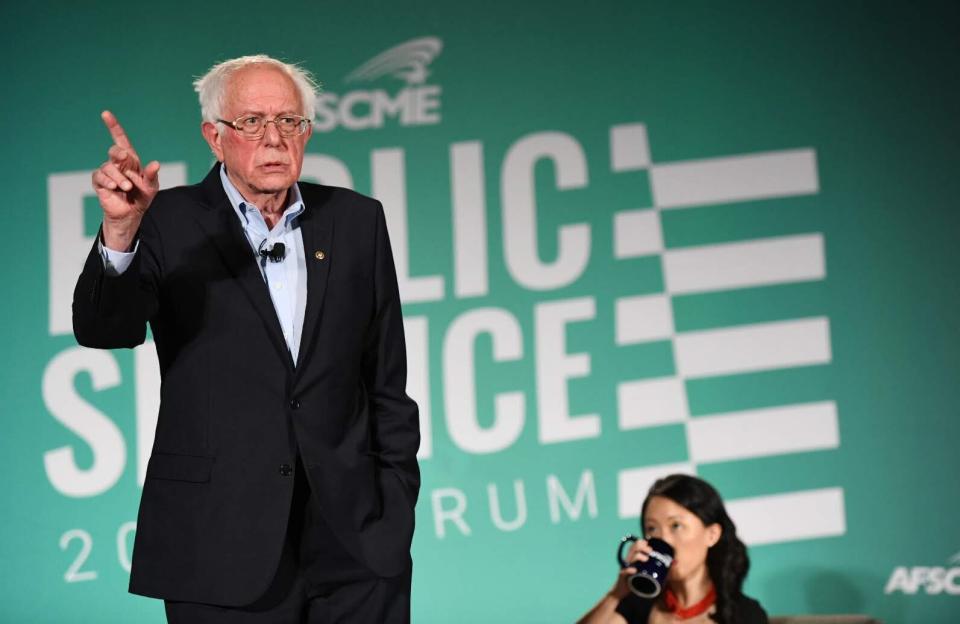Democratic Candidates Vow To Rebuild Unions At Las Vegas Presidential Forum
LAS VEGAS ― Nineteen Democratic presidential hopefuls descended on Las Vegas Saturday and made their case directly to union workers for how they would fix an economic system that caters to the rich.
Over the course of seven hours at the University of Nevada, Las Vegas, candidates from former Vice President Joe Biden to long shot Washington Gov. Jay Inslee took questions from public-sector employees about how they would rebuild unions, provide affordable health care to more Americans and undo the policies of the Trump administration.
The forum ― hosted by the American Federation of State, County and Municipal Employees, and moderated by HuffPost’s Amanda Terkel and The Nevada Independent’s Jon Ralston ― provided the candidates their own individual time to burrow deep into policy and defend their records. It also underscored the influence of organized labor in this primary, with nearly every serious contender in attendance to court union support.
Unlike the double bill of Democratic debates in Detroit earlier this week, the Las Vegas forum didn’t include face-to-face attacks between moderates and progressives. Instead, there was a lot of agreement among the field ― in particular, that the next Democratic president needs to help rebuild organized labor, with the union membership rate in the U.S. now hovering near a historic low of just 10.5%.
“This has been an all-out war on suppressing wages to increase profits,” Biden, still the clear front-runner, told the crowd.

Many of the candidates pledged to overhaul labor laws to make it easier for workers to join unions, and attacked both corporations and the political elite for weakening workers’ bargaining power over the years. The candidates fielded questions directly from AFSCME members both in person and via video from around the country.
Unions play a major role in getting Democrats elected and can easily influence a primary race if they choose to weigh in. But several major unions, including AFSCME, have said they will take their time in making an endorsement, if they make one at all in the primary. Lee Saunders, the union’s president, said AFSCME is taking a more deliberate approach than the 2016 election, when leaders quickly got behind Hillary Clinton over Sen. Bernie Sanders (I-Vt.).
“We’ve got a lot of friends in the race. We want to hear what they’ve got to say. We want to hear them talk about the importance of unions,” Saunders said. “So we’re going to take our time with this and we’re going to be smart and we’re going to be strategic.”
Every candidate who appeared at the forum said they would support a federal law to guarantee all public-sector workers the right to bargain collectively (many states currently ban it). Some, like Sanders and Montana Gov. Steve Bullock, spoke in detail about how they would increase union membership to boost wages.
“There’s been a collective attack on the right to organize,” said Bullock. He advocated for “card check” legislation that would make it harder for employers to dissuade workers from unionizing. “We need to do things to make it easier to bargain collectively, not make it harder.”
Sen. Elizabeth Warren (Mass.) said if she were elected, she would commit to making sure labor leaders had a place in her administration.
“This is the part that always just astonishes me,” Warren said. “Donald Trump ran on draining the swamp. What did he turn around and do? He brought in the biggest swamp rats and put them in charge.”
As for the idea of putting a labor leader in charge of the Labor Department, “That’s what I want,” Warren said.
It was the sort of talk that labor leaders have been eager to hear as the primary heats up. As HuffPost reported earlier this week, Richard Trumka, the head of the 55-union AFL-CIO labor federation, told all the campaigns at a closed-door meeting Wednesday that Democrats had failed unions in the past and shouldn’t take their support for granted anymore.
Mary Kay Henry, the president of the Service Employees International Union, told HuffPost ahead of the forum that she was waiting to see the whole field of candidates put forth bold ideas that would advance collective bargaining.
“We’d like to see more candidates offer concrete ideas for how people can join together,” Henry said. Despite union jobs being discussed in the Detroit debates, she added, “there was virtually no discussion of how a presidential candidate would empower workers to join unions.”
Biden, leading in virtually all polls, has held himself out as a union man throughout his decades-long political career. Nonetheless, he was asked about the failure of Democrats and the Obama White House to pass card check legislation during Obama’s first term. The missed opportunity still rankles labor activists who feel the law too easily allows employers to disrupt organizing campaigns.

Biden said Obama’s administration was unable to get the bill through because Democrats didn’t have control of Congress. But in fact, the bill was alive in 2009, when Democrats had majorities in both the House and Senate; they lost the House the following year.
“There were other things that were happening as well at the same time, and we did not have a Democratic Congress to be able to get it done,” Biden said.
As he might have expected at a labor forum, Sen. Cory Booker (N.J.) found himself defending his record as a promoter of charter schools in his time as the mayor of Newark, N.J. Charter schools are falling out of fashion in the Democratic Party after last year’s historic teacher strikes. Booker’s boosterism for them has put him at odds with teachers unions that contend such schools siphon money away from already underfunded public education. He noted that the largest teachers unions in New Jersey supported his Senate candidacy.
“There’s an assault on public education that is outrageous and unacceptable,” Booker said. “We have to be a nation that doesn’t drive teachers into poverty wages but elevates that profession. ... My focus and my priorities will be public education.”
Much of the forum also focused on Democratic voters’ top issue so far in the campaign: health care. Moderate candidates like Bullock continued making their argument for incremental change by improving Obamacare and making insurance and prescription drugs more affordable. More progressive candidates like Sanders attacked private insurers and pressed the case for ambitious reform through “Medicare for All.”
A contentious theme has emerged on the campaign trail in which more centrist candidates argue a single-payer health care program would hurt union workers who’ve collectively bargained for strong health plans. Sanders insisted his Medicare for All bill would create coverage on par with union plans, while benefiting workers by taking health care off the bargaining table.
“Every time you guys sit down and negotiate … that is in the midst of every labor negotiation,” Sanders said. With Medicare for All, “you can sit down and negotiate decent wage increases.”
Although the candidates didn’t knock one another often, a few of them addressed the broader question hanging over the primary: whether the party should put up a progressive who excites the base, or a centrist who might have a better chance of winning over Trump voters.
New York Mayor Bill de Blasio posed the question on his own.
“Do we need to nominate a moderate to win in 2020? No. It is a trap,” de Blasio said. “When you listen to the moderates, I don’t find them inspiring. I don’t find them uplifting. I don’t find them visionary.”
De Blasio argued that only a clear progressive could excite voters enough to put the White House back in Democratic hands.
“If they don’t hear passion and change, you’re going to see Donald Trump get four more years,” he said. “Let’s be the party of working people again.”
Love HuffPost? Become a founding member of HuffPost Plus today.
Related...
Labor Puts Candidates On Notice: 'Let's Be Honest About The Democratic Party's Record'
Elizabeth Warren Is Not Worried About Senate Obstruction Of Her Ambitious Agenda
Joe Biden Defends Obama's Immigration Record But Admits He's Learned From Experience
Bernie Sanders Says Student Debt Cancellation Plan Will Reduce Racial Wealth Gap
This article originally appeared on HuffPost.

